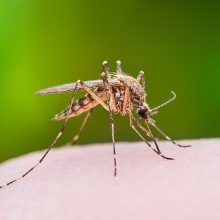Mosquitoes in the Netherlands capable of transmitting Zika and Usutu viruses
30 August 2019

Researchers have found that a species of mosquito in the Netherlands is capable of transmitting viruses Zika and Usutu in the laboratory. The mosquito, called the Asian bush mosquito (Aedes japonicus) was first discovered in the Netherlands in 2013. This mosquito is usually seen in Japan and Korea but has become an invasive species in Europe and the US.
The researchers, from Wageningen University in the Netherlands, infected Asian bush mosquitoes with Zika virus or Usutu virus and tested their saliva for the virus after 14 days. They found that 3% of the mosquitoes fed with blood containing Zika virus had the virus in their saliva, while 13% tested positive for Usutu virus.
The presence of a virus in mosquito saliva means it can be passed on when the insect bites to feed on blood. According to Sandra Abbo, researcher at Wageningen University, the presence of an arbovirus in the saliva doesn’t necessarily mean that it will cause infection when the insect bites. She said; “The amount of virus in the mosquito saliva also needs to be high enough to induce infection in an animal or human. Our study shows that Zika virus and Usutu virus can end up in the saliva of the Asian bush mosquito, however whether a bite by an infected Asian bush mosquito can result in infections in animals or humans is still unknown.”
During their experiments, the mosquitoes were kept at 28°C; much warmer than typical conditions in the Netherlands. Abbo said; “The average summer temperature in north-western European countries such as the Netherlands is around 18°C. Our next step would therefore be to test whether the Asian bush mosquito found in the Netherlands can also transmit Zika virus and Usutu virus at temperatures lower than 28°C.”
Only female mosquitoes bite humans and animals to collect blood. This blood is essential in mosquito reproduction and egg development. According to Abbo, mosquitoes will usually bite only once: “If the mosquito does not take up the desired amount of blood, for example because she was disturbed during feeding, she could bite multiple animals and/or humans within a 24 hour period” she said.
Infection with Zika virus usually causes mild symptoms including a fever, rash and muscle pain. However, the virus can cause complications in pregnant women including preterm birth and congenital malformations including a smaller than usual head. The virus can infect a wide range of animals but is known to cause disease only in primates and humans. There is currently no vaccine available to protect against Zika infection.
Usutu virus is an emerging zoonotic virus of African origin and is known to infect humans and birds. Usutu virus has been present in Europe for some time and has been known to cause large die-offs of blackbirds across Europe. In humans, the virus can cause swelling of the brain, or encephalitis, however this is extremely rare.
Sandra Abbo will present her data at the International Meeting on Arboviruses and their Vectors 2019 (IMAV 2019). Her talk, ‘The invasive Asian bush mosquito found in the Netherlands can experimentally transmit Zika virus and Usutu virus’, will take place at 16:15 on 5 September. The meeting is held at the University of Glasgow from 5–6 September.
Image: iStock/nechaev-kon.
